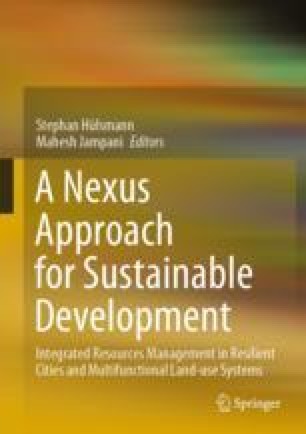The nexus approach as a tool for resources management in resilient cities and multifunctional land-use systems
Abstract
The Nexus Approach to environmental resources management is increasingly recognized as an important vehicle to achieve sustainability as spelled out in the Sustainable Development Goals (SDGs). In particular, it was argued that the Nexus Approach is key for the sustainable use of environmental resources under conditions of global change and provides a tool to deal with challenges of global change including climate change, urbanization and population growth. Building on conceptual considerations with regard to monitoring and implementation outlined earlier, here, we explore how the Nexus Approach may provide solutions for managing resources in multifunctional land-use systems and resilient cities. In fact, the resources perspective is essential for holistic management of water, soil and waste along the urban–rural axis. Peri-urban areas provide perfect examples of multifunctional systems with manyfold opportunities to closing cycles, improve resource efficiency and mitigate trade-offs. Cases described in this book provide both positive as well as negative examples of what can be achieved by applying nexus thinking and what goes wrong if you don’t. Key messages emerging include: (i) participatory approaches are a central element for successful implementation of a nexus approach, (ii) effective mechanisms of knowledge transfer are a prerequisite of adoption and upscaling of nexus approaches and (iii) the lack of economic incentives and lack of data represent major challenges for the implementation of a nexus approach. Overall, the importance of a nexus mindset of all stakeholders involved in nexus cases and of providing an enabling environment by nexus-oriented governance, including appropriate economic instruments, was confirmed.

